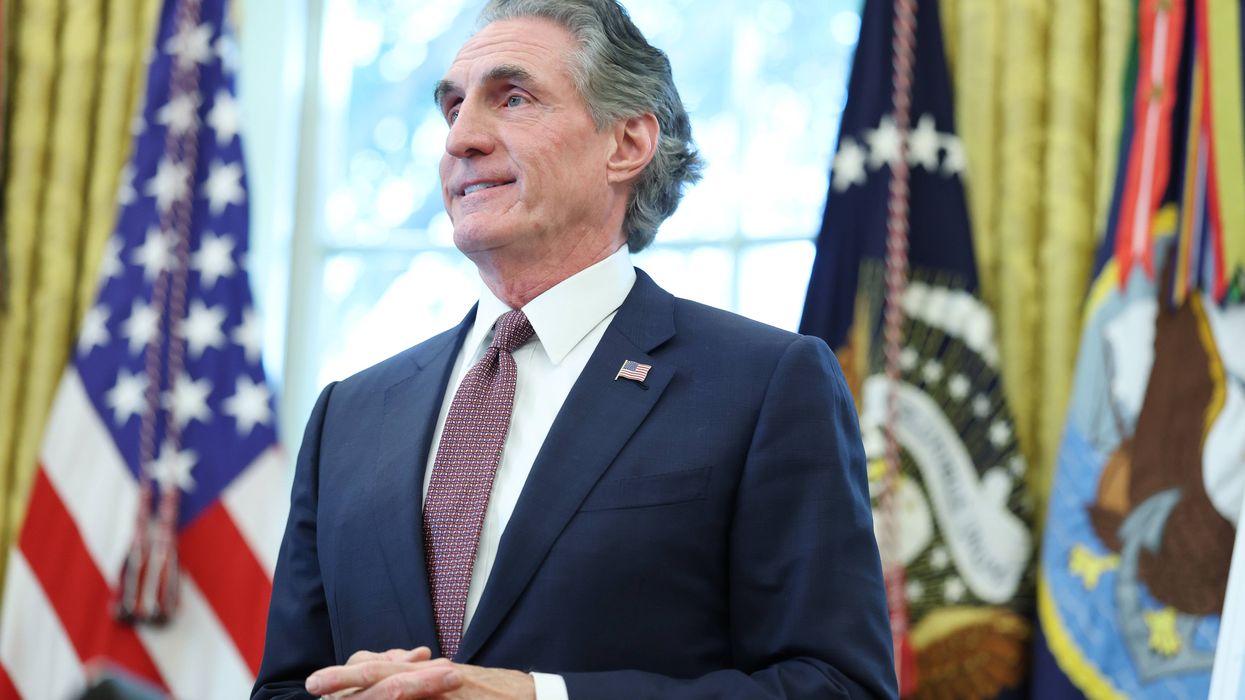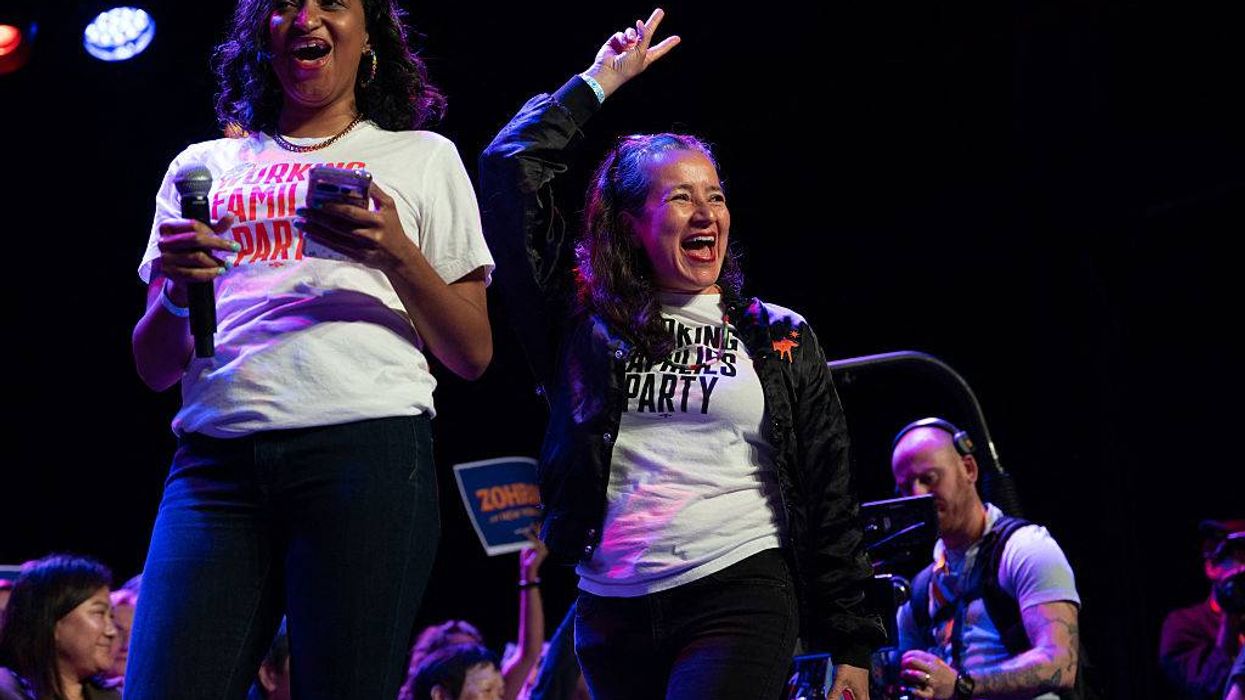January, 20 2021, 11:00pm EDT

For Immediate Release
Contact:
Kristian Bailey, Palestine Legal,(312) 547-0766, kbailey@palestinelegal.org
Jen Nessel, Center for Constitutional Rights, (212) 614-6449, jnessel@ccrjustice.org
Fordham Students Seek Appeal of Ruling Allowing Prohibition of Students for Justice in Palestine Club
Fordham censorship motivated by anti-Palestinian bias, advocates say.
WASHINGTON
Today, civil rights groups asked the New York Court of Appeals, the highest court in New York State, to hear an appeal of a ruling that allows Fordham University to censor student speech. The petition comes in a lawsuit brought by Fordham students prohibited by the university from forming a Students for Justice in Palestine (SJP) school club because of the group's "political goals" and because of claims it would be "polarizing."
"I am beyond disappointed with the court's shameful decision," said Veer Shetty, a senior at Fordham and vice president of Fordham Students for Justice in Palestine. "We have been fighting for five years now just to have a space where we can discuss and advocate for Palestinian rights on campus-- it's awful that Fordham continues to censor us. We are on the right side of history, and I'm confident that in the end justice will prevail."
Advocates emphasize that Fordham's censorship of SJP is particularly egregious at a time when the university claims it is reckoning with institutional racism, including its historical failures on racial justice, and prioritizing values of anti-racism, diversity, and inclusion.
The students seek to appeal a December 2020 decision that reversed, with minimal analysis, a thorough ruling by the trial court in August 2019 holding that Fordham's refusal to recognize SJP was irrational and inconsistent with its own policies, which protect free expression. Following the lower court decision, which ordered Fordham to recognize the club, Fordham SJP has been in operation - without incident - for the last two semesters.
Today's petition argues that the lower court's decision improperly ignored the ongoing harm the ban created, and that the decision to ban SJP was irrational because it was contrary to Fordham's policies and the facts at hand.
In the fall of 2015, Fordham University students applied to start a Students for Justice in Palestine club on campus. Over the next year, administrators required the students to attend multiple meetings, questioned students about their political views, and demanded amendments to SJP's constitution. Finally, in November 2016, Fordham's undergraduate student government approved SJP as a student club--only to have Fordham Dean of Students Keith Eldredge take the unprecedented step of vetoing the student government's approval.
Though all of the students who originally sought to form the SJP club have since graduated, current Fordham students are continuing the fight. If permitted to stand, the appellate division's reversal of the trial court's ruling would allow Fordham to once again prohibit the club on the explicit basis of SJP's "political goals" and the possibility it would lead to "polarization."
"We believe in the students' right to organize for Palestinian rights and will support them every step of the way," said Radhika Sainath, senior staff attorney at Palestine Legal. "The Court of Appeals must stop this blatant censorship in its tracks."
The movement for Palestinian rights has continued to grow, at Fordham and around the country, despite Fordham's official censorship of SJP, and despite coordinated nationwide attacks on people organizing for Palestinian rights.
"The Fordham students' brave fight for Palestinian justice deserved a more respectful hearing than it was given by the Appellate Division. Let's hope that the Court of Appeals recognizes the moral and legal significance of this case," said Center for Constitutional Rights cooperating counsel Alan Levine.
The Center for Constitutional Rights, Palestine Legal, and attorney Alan Levine sued Fordham on behalf of four students in April 2017, winning the case in August 2019 when a New York court annulled Fordham's decision, mandating that the university recognize SJP as an official club.
Fordham appealed the ruling in January 2020, and the appellate division dismissed the case in December. Six amicus briefs in support of the students were filed in the appeal, by Defending Rights & Dissent, Fordham professors, Catholic scholars, Jewish Studies scholars, Jewish Voice for Peace, the Foundation for Individual Rights in Education/Pen America Center/ and the National Coalition Against Censorship.
For more information, visit the Center for Constitutional Rights' case page and Palestine Legal's case page.
The Center for Constitutional Rights is dedicated to advancing and protecting the rights guaranteed by the United States Constitution and the Universal Declaration of Human Rights. CCR is committed to the creative use of law as a positive force for social change.
(212) 614-6464LATEST NEWS
Watchdog Warns Trump and Burgum's Halting of Offshore Wind Projects Is Illegal
“Burgum’s actions on offshore wind appear to be motivated by the personal financial interests of those in the administration, not our collective national interests."
Dec 29, 2025
A week after the US Department of the Interior said it was immediately halting five offshore wind projects in the interest of "national security," a watchdog group told congressional committees Monday that the move is "not legally defensible" and raises "significant" questions about conflicts of interest concerning a top DOI official's investments in fossil gas.
Timothy Whitehouse, executive director of Public Employees for Environmental Responsibility (PEER), wrote to the top members of the Senate Energy and Natural Resources Committee and the House Committee on Natural Resources regarding the pause on projects off the coasts of Virginia, New York, Rhode Island, Connecticut, and Massachusetts—projects that account for billions of dollars in investment, employ thousands of people, and generate sustainable energy for roughly 2.5 million homes and businesses.
The announcement made by Interior Secretary Doug Burgum last week pertained to "five vague, perfunctory, cookie-cutter orders" halting the projects, wrote Whitehouse, but PEER is concerned that the orders were issued to evade the Congressional Review Act (CRA), under which the action to halt the projects likely constitutes a "major rule."
Whitehouse explained:
Under the CRA, a rule that meets any one of three criteria (an annual effect on the economy of $100,000,000 or more; a major increase in costs or prices for consumers, individual industries, federal, state, or local government agencies, or geographic regions; or in pertinent part significant adverse effects on competition, employment, investment, productivity, or innovation) is a major rule. Interior’s pause likely meets all three.
As a major rule under the CRA, the pause cannot take effect until at least 60 days after BOEM provides Congress the requisite notification and report under the CRA, which, according to GAO’s database, has not yet occurred. Congress must use its oversight authority to unveil the truth and, as appropriate, and to enforce the rule of law.
He said in a statement that “Burgum’s move is designed to bypass all congressional and public input."
The CRA states that a rule is "the whole or a part of an agency statement of general or particular applicability and future effect designed to implement, interpret, or prescribe law or policy or describing the organization, procedure, or practice requirements of an agency.”
Press statements by the DOI and by Burgum last week were "statements of general applicability and imminent future effect, designed to implement policy," wrote Whitehouse, who also said the interior secretary embarked on "a coordinated rollout with Fox News entities."
On December 22, Fox anchor Maria Bartiromo asked Burgum at 8:00 am Eastern, “What next action did you want to tell us about this morning?” Five minutes later, FoxNews.com published its first story on Burgum's orders, citing a press release that had not yet been made public and including a quote from the secretary about the "emerging national security risk" posed by the offshore wind projects.
"If last week’s actions are allowed to stand, future presidents will have unchecked authority under the guise of national security to target federal leases related to entire disfavored energy industries for political purposes."
Burgum's announcement to Fox came at least one to two hours before Bureau of Ocean Energy Management (BOEM) acting Director Matthew Giacona provided the orders to the lessees running the five wind projects.
Further, wrote Whitehouse, "Burgum’s voluminous public comments in the hours and days since the pause further show the true purpose of Interior’s singular action."
"The national security pretext quickly gives way to broad and spurious talking points about the 'Green New Scam,' how 'wind doesn’t blow 24-7' (evincing Burgum’s seeming unfamiliarity with energy storage technologies), and unyielding promotion of liquified natural gas projects," wrote Whitehouse.
Aside from the alleged illegality of Burgum's order, PEER pointed to Giacona's potential conflicts of interest with BOEM operations and specifically with halting wind projects. Giacona is a "diligent filer" of financial disclosure forms required by the Ethics in Government Act, noted Whitehouse—but those forms point to potential benefits he may reap from shutting down offshore wind infrastructure.
Giacona reported his purchase of interests in the United States Natural Gas Fund (UNG) on September 16. The fund tracks daily price movements of "natural" gas delivered at the Henry Hub in Louisiana and is subject to regulation by the Commodity Futures Trading Commission.
"Accordingly, a government employee who has an interest in UNG also has a potential conflict of interest with the underlying holdings of UNG (currently primarily natural gas futures contracts at the Henry Hub)," wrote Whitehouse.
PEER does not know whether Giacona continues to hold a financial interest in UNG or whether the offshore wind pause will have a "direct and predictable effect on a financial interest in UNG," but Whitehouse noted that Burgum and DIO have entwined the pause with the promotion of liquefied natural gas.
"It is disconcerting that Mr. Giacona temporarily had even a de minimis financial interest in natural gas futures while also leading the agency that manages the development of natural gas resources on the outer continental shelf," wrote Whitehouse, adding that Giacona also sold interests in the United States Oil Fund on September 3, while overseeing BOEM.
Based on Giacona's investments, said Whitehouse, “Burgum’s actions on offshore wind appear to be motivated by the personal financial interests of those in the administration, not our collective national interests. This is another misguided step in transforming the federal government into a franchise of the fossil fuel industry.”
“On public lands across the United States, the Department of the Interior has tens of thousands of additional active leases related to oil, gas, wind, solar, and geothermal production and mining for energy-related minerals," he added. "If last week’s actions are allowed to stand, future presidents will have unchecked authority under the guise of national security to target federal leases related to entire disfavored energy industries for political purposes."
Keep ReadingShow Less
Trump Suggests US Bombed 'Big Facility' in Venezuela. No One Seems to Know What He's Talking About
Administration officials have yet to provide any details about the supposed strike, which would mark a massive escalation in the president's lawless military campaign.
Dec 29, 2025
President Donald Trump claimed during a recent discussion about his high-seas boat bombing blitz that US forces took out "a big facility" as part of the Venezuela-centered campaign—but no one seems to know what he's talking about.
Trump said Friday during an apparently impromptu phone call to billionaire supporter John Catsimatidis—who owns and hosts programming on WABC radio in New York—that South American narcotraffickers "have a big plant or a big facility where the ships come from," and that “two nights ago, we knocked that out.”
"We hit them very hard," the president added.
On Monday, Trump was asked during a meeting with fugitive Israeli Prime Minister Benjamin Netanyahu to clarify Friday's claim.
"There was a major explosion in the dock area where they load the boats up with drugs," the president said, "so we hit all the boats and now we hit the area. It's the implementation area. That's where they implement, and that is no longer around."
Neither Trump nor anyone in his administration offered any evidence to support the claim. There have also been no public statements from any Venezuelan government official regarding any US attack.
Q: Can you say any more about the explosion in Venezuela that you mentioned in a radio interview. Did the military do that?
TRUMP: Well, it doesn't matter. But there was a major explosion in the dock area where they load the boats up with drugs. We hit the area. pic.twitter.com/hvZa7fKxbq
— Aaron Rupar (@atrupar) December 29, 2025
Trump did say during a Christmas Eve call to troops taking part in escalating hostilities against Venezuela—whose socialist leader, President Nicolás Maduro, has long been in Trump's regime-change crosshairs—that, after more than two dozen boat strikes, "now we're going after the land."
Threats by Trump to bomb targets inside Venezuela—or even invade the oil-rich South American nation in order to oust Maduro—are nothing new. The president has deployed an armada of warships and thousands of US troops to the region and has also authorized covert Central Intelligence Agency action against Maduro. Earlier this month, Trump vowed that the US would attack Venezuela "on land," and "very soon, too."
However, Trump's remarks on Friday left observers scratching their heads and scouring news reports in a fruitless effort to make sense of the president's claim.
One US official interviewed by the Intercept on condition of anonymity said the US targeted a “facility"—but declined to disclose its location, or whether it was attacked by US forces.
“That announcement was misleading,” the official said of Trump's claim last week.
There is some speculation that a Christmas Eve explosion and fire at a warehouse on the grounds of a Primazol chemical plant in Zulia state may have been caused by a US strike. However, the site—which reportedly makes products including chicken feed—is not located directly on any coast, and Primazol issued a statement "categorically" rejecting claims that the facility was bombed.
If Trump did order any bombing of targets in Venezuela, it would be a major escalation and clear act of war by a man who, while billing himself as "the most anti-war president in history," has now, with last week's attack on Nigeria, bombed more countries than any president in history.
Keep ReadingShow Less
Working Families Party Seeks Banner Year as Trump-Led GOP Appears Poised for ‘Landslide Electoral Defeat’
"I don't think there’s been a better and more right time for a third party to emerge in this country that speaks to the interest of everyday working people," said Maurice Mitchell, national director of the Working Families Party.
Dec 29, 2025
The Working Families Party is gearing up to have a banner year in the 2026 midterms at a time when political trends show the Republican Party led by President Donald Trump heading for a major loss.
The party, which is now active in 18 states, is preparing to "ramp up its involvement in primary elections, supporting candidates that emphasize working-class politics and seek to disrupt the political status quo," according to a Monday report in the Guardian.
The Working Families Party (WFP) had a number of victories in 2025, highlighted by its election of democratic socialist Zohran Mamdani as mayor of New York City.
Maurice Mitchell, national director of the WFP, told the Guardian that he thinks now is the right time for a populist progressive insurgency given that both Democrats' and Republicans' brands are underwater with US voters.
"Less and less people are identifying as being a Democrat or Republican," he said. "I don't think there’s been a better and more right time for a third party to emerge in this country that speaks to the interest of everyday working people. I believe that our time has come."
Although the WFP has traditionally worked within the confines of Democratic Party primary politics, the party this year elected some candidates in the New Jersey General Assembly that lacked backing from state Democratic Party bigwigs.
"This is really the first time that there’s been Working Families candidates that ran outside of the Democratic Party structure, and so we’re building what that future looks like and what it means," Katie Brennan, a New Jersey assemblywoman-elect endorsed by the WFP who won without official Democratic Party backing, told the Guardian. “They've grown and have been making progress year in and year out, and this next year will be big for us. Now we’re in the statehouse, and what does that mean? I think it’ll continue to bring attention to the Working Families party."
One issue that the WFP hopes will propel its candidates to victory in 2026 is the nationwide backlash to artificial intelligence data centers.
In an announcement made earlier this month, the WFP said it is recruiting candidates to run against building AI data centers, which have been blamed for spiking utility bills and draining water resources, in their local communities.
“Billionaires are getting richer from data centers, while working people see their electricity and water bills go through the roof,” said Ravi Mangla, national press secretary for the WFP. "Fortunately, regular people are joining with their neighbors to push back against these big tech takeovers. We’re inviting local leaders who are fighting back to consider running for the seats where decisions about data centers are being made.”
Another reason the party may sense an opportunity is that the Trump-led GOP appears headed for brutal elections in 2026.
Polling expert G. Elliot Morris published an analysis on Monday showing that Trump's current net approval rating of -16 percentage points will likely translate into a "landslide electoral defeat" for Republicans next year.
Morris added that Trump's approval on the issue of inflation was "downright catastrophic," and noted that the president has been bleeding support even in states that voted for him by decisive margins last year.
"Trump’s approval rating is not just underwater because of Democratic resistance," he observed. "Lots of independents and Republicans disapprove of how he’s running the country, too. In fact, the decline from Trump’s vote margin in 2024 is steeper in redder parts of the country."
Keep ReadingShow Less
Most Popular


